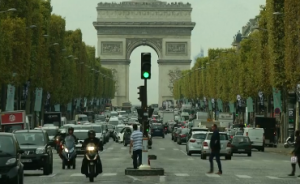
(Reuters) — While Western governments have focused on the thousands of male jihadist volunteers who have left for Syria and Iraq, security officials in Europe are expressing alarm about a smaller but steady stream of female groups heading the same way.
France, which is home to Europe’s biggest Muslim community, struggles with the flow of would-be jihadists to Syria and French Interior Minister Bernard Cazeneuve believes almost a thousand French citizens are either already there or trying to go. Among them are dozens of girls and young women from France who have left for jihad in Syria, up from just a handful 10 months ago, French officials say.
Many of the youngest girls are lured with promises of humanitarian work.
It is only once in Syria that they discover their fate: forced marriage to a fighter, strict adherence to Islamic law, a life under surveillance and little hope of returning home, say parents, relatives and radicalisation experts.
They come from all walks of life, from first and second generation immigrants from Muslim countries, from white French backgrounds, from both rich and poor, urban and rural communities, experts say.
Nora and Sahra are among them.
Nora’s brother, Foad El Bahty, a French truck driver of Moroccan origin travelled alone throughSyria last spring to rescue his 15-year-old sister from an Islamist group she said was holding her captive.
In a interview with Reuters on October 6, El Bahty said he is convinced that his sister Nora, whom he described as an impressionable teen who loved Disney movies before leaving for Syria one day in January, stayed on because she was threatened with execution by the French-speaking commander, or emir, of the group she joined.
El Bahty described the moving moment when he finally stood face to face with his sister and said they could not stop crying.
“They took me to my sister the day after, it was 11.30pm, I saw my sister like on the picture. It was like a cold shower. She started to cry, I was crying, I had a lot of questions to ask, I did not ask any. Frankly, I forgot everything. We started to cry, to hold each other in our hands, in our arms. We were reassuring each other. She couldn’t stop holding on to me, she was holding me tight. At some point I said: “So, are you coming back with me?” but she started to bang her head against a wall saying “I can’t, I can’t, I can’t.” At the beginning it made me furious, I told her “With all I did for you, now you don’t want to come?” But she kept saying “I can’t, I can’t, I can’t” and she started to bang her head against the wall, she was crying,” El Bahty said.
He said Nora had told him her first location was in Aleppo but declined to give the location of their second encounter because he said French police had asked him not to reveal details relevant to investigations. He said a conversation he overheard between his sister and the emir suggested she was warned to stay.
Making up about 10 percent of all departures for Islamist-held areas, according to government officials and terrorism experts, young women are seen as prizes for fighters keen to marry.

His quest to bring her home took him to Turkey’s border with Syria, where he was taken in by Islamist militants and driven to a city he declined to name due to the sensitive nature of the information.
The town was “full” of foreigners, each nationality having its own supply stores, including one area that was totally French-speaking, he said.
“I found myself in a place where there were only French people. It was like being in France, it wasFrance. The first thing that struck me is the fact that people say there are about 15 girls under 18 over there. When I arrived there, I had to stop myself laughing. We were far away from 15, there were a lot of groups, and a lot of French speakers. There were a lot of nationalities, some Americans, some Australians, some British, they had stores, there were Uzbek people too, Chechens, Afghans, Chinese, Koreans, Japanese, each in their Katiba,” he said.
El Bahty says his sister currently lives with the close aide of an emir and is in charge of daycare for militants’ children.
She had earlier escaped a forced marriage arranged by a French recruiter who has since returned to France and is being held in custody.
Jonathan Ali Mehenni, whose sister Sahra disappeared from their home in southern France seven months ago, says he believes his sister, 17, also lives under strict surveillance.
Her family has spoken to her only twice since she left and communicates a bit via social media.
The young girl married a 25-year-old Tunisian just days after she got to Syria.
Ali Mehenni believes that someone is telling her what to say and says her family no longer knows if she is the one posting the messages.
She says she doesn’t plan to return to France.

“She doesn’t say she is disappointed. She says she is fine where she is, that she doesn’t want to come back, that everything is nice over there. I don’t understand, I don’t understand,” Ali Mehennisaid.
As with other girls, Nora and Sahra’s embrace of radical Islam came as a shock to their families, who are not which are not strictly observant.
None of the girls showed any signs of their plans in the days before leaving.
“I spoke with her the day before she left, we were kidding, we were joking on the phone, we spoke totally normally like a brother and a sister talk together, there was nothing that could have made us worry about such or such thing, everything was normal, when my father dropped her at school on March 11, everything was normal,” Ali Mehenni said.
French anthropologist Dounia Bouzar is the author of “They are seeking Paradise, They’ve found Hell”, a new book that traces the paths of those like Nora and Sahra.
She follows 130 families concerned by the radicalisation of their children and says that while many women being radicalised hail from moderate Muslim households, all kinds of religious and social backgrounds are represented.
“Until now, “radical Islam” affected mainly boys, those we call “sensitive boys”, unemployed and facing family problems. Since March of this year, I have been called by a large number of mothers who have talked about their enrolled daughters. These mothers are teachers, lawyers, public employees, coming very often from atheist families, from families which have nothing to do with the history or the memory of Islam,” Bouzar said.
She runs an anti-radicalisation group that focuses on stopping teens from leaving because the likelihood of getting a young woman back from Islamic State or other Islamist groups she says is nearly non-existent.
“The truth is that no girl has returned alive until now, but that is not our last word. But for the moment, no girl has been able to escape alive,” she added.
While women do not fight — although some form police units — their homes are near combat zones and exposed to bombing from coalition warplanes fighting the Islamic State. Women have little hope of escaping if they change their minds.







